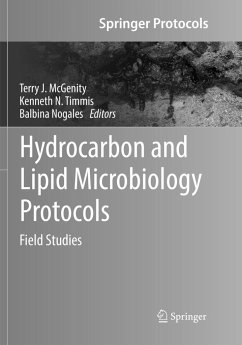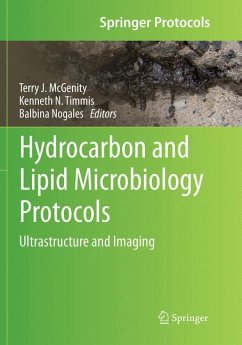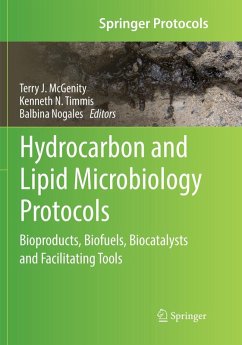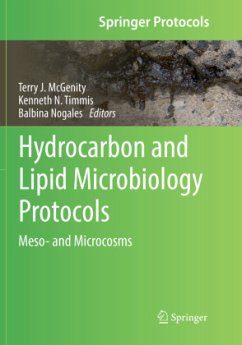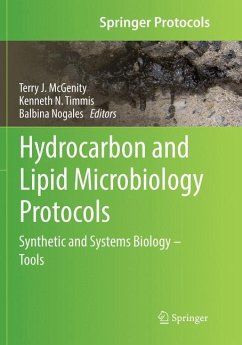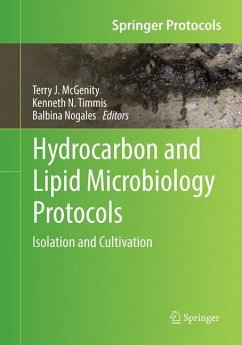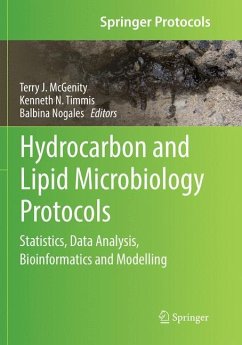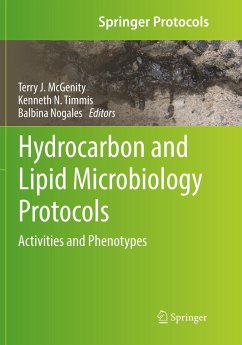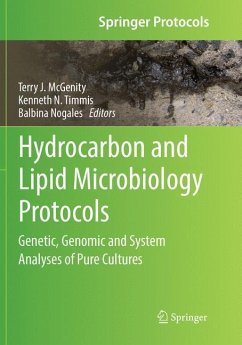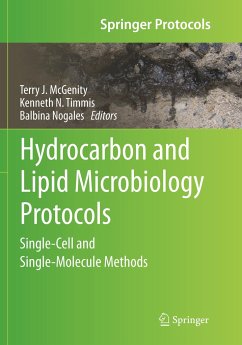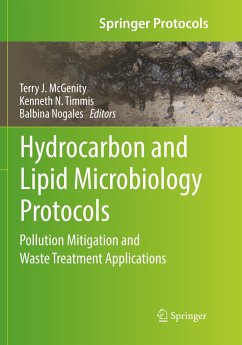
Hydrocarbon and Lipid Microbiology Protocols
Pollution Mitigation and Waste Treatment Applications
Herausgegeben: McGenity, Terry J.; Timmis, Kenneth N.; Nogales, Balbina
Versandkostenfrei!
Versandfertig in 6-10 Tagen
76,99 €
inkl. MwSt.

PAYBACK Punkte
38 °P sammeln!
This Volume presents applications of hydrocarbon microbiology in the context of environmental pollutant degradation, covering pollutants such as petroleum and related wastes (i.e. oil sludge), biofuels, lipid-rich wastes, chlorinated solvents and BTEX, in several environments (marine, soil, groundwater). The approaches presented range from laboratory experiments and treatment in reactors to field applications. Two chapters highlight innovative approaches to address relevant questions in pollutant degradation, such as low environmental concentrations of pollutants, and the biodegradation of com...
This Volume presents applications of hydrocarbon microbiology in the context of environmental pollutant degradation, covering pollutants such as petroleum and related wastes (i.e. oil sludge), biofuels, lipid-rich wastes, chlorinated solvents and BTEX, in several environments (marine, soil, groundwater). The approaches presented range from laboratory experiments and treatment in reactors to field applications. Two chapters highlight innovative approaches to address relevant questions in pollutant degradation, such as low environmental concentrations of pollutants, and the biodegradation of complex pollutant mixtures using biofilms. Rather than presenting the applications in the form of protocols, some of the chapters in this Volume include detailed practical information on the opportunities offered by and limitations of the different approaches, providing valuable information for researchers planning to perform bioremediation experiments.
Hydrocarbon and Lipid Microbiology Protocols
There are tens of thousands of structurally different hydrocarbons, hydrocarbon derivatives and lipids, and a wide array of these molecules are required for cells to function. The global hydrocarbon cycle, which is largely driven by microorganisms, has a major impact on our environment and climate. Microbes are responsible for cleaning up the environmental pollution caused by the exploitation of hydrocarbon reservoirs and will also be pivotal in reducing our reliance on fossil fuels by providing biofuels, plastics and industrial chemicals. Gaining an understanding of the relevant functions of the wide range of microbes that produce, consume and modify hydrocarbons and related compounds will be key to responding to these challenges. This comprehensive collection of current and emerging protocols will facilitate acquisition of this understanding and exploitation of useful activities of such microbes.
Hydrocarbon and Lipid Microbiology Protocols
There are tens of thousands of structurally different hydrocarbons, hydrocarbon derivatives and lipids, and a wide array of these molecules are required for cells to function. The global hydrocarbon cycle, which is largely driven by microorganisms, has a major impact on our environment and climate. Microbes are responsible for cleaning up the environmental pollution caused by the exploitation of hydrocarbon reservoirs and will also be pivotal in reducing our reliance on fossil fuels by providing biofuels, plastics and industrial chemicals. Gaining an understanding of the relevant functions of the wide range of microbes that produce, consume and modify hydrocarbons and related compounds will be key to responding to these challenges. This comprehensive collection of current and emerging protocols will facilitate acquisition of this understanding and exploitation of useful activities of such microbes.



